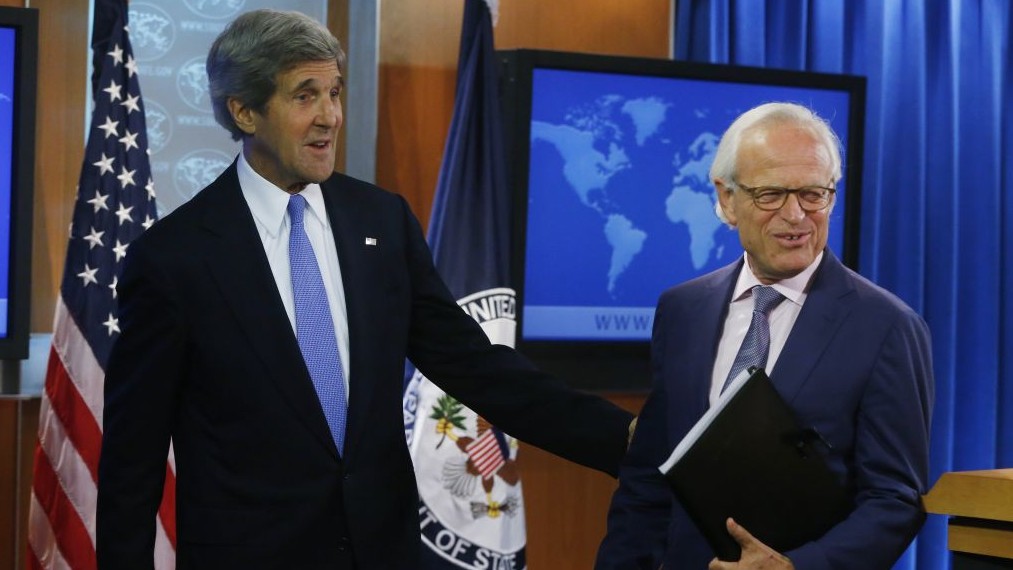UPDATES
US “Framework” for peace document on the way?
January 31, 2014

Update from AIJAC
January 31, 2014
Number 01/14 #06
Today’s Update deals with reports that the US is only weeks away from issuing a “framework” document outlining broad principles for Israeli-Palestinian peace that it is hoped both sides can adopt with reservations.
We lead with a news report based on off-the-record briefings given by former Australian Martin Indyk, the American mediator, about the content of, and plans for, the “framework document.” Indyk reportedly told US Jewish leaders in the phone hook-up that the document will be released within a few weeks and will contain few surprises for either side, because it is based on extensive consultations with them. He also outlined some of the provisions – including meeting Israeli demands for language promising “two states for two peoples” and detailed arrangements for a Jordan Valley security zone. For the rest of the details of what Indyk reportedly said about the “framework document”, CLICK HERE.
Next, conflict resolution specialist Dr. Gerald Steinberg offers a critique of elements of the current American approach to peacemaking under US Secretary of State John Kerry. Taking off from controversial comments, later apologised for, by Israeli Defence Minister Moshe Yaalon that accused Kerry of “messianism”, Steinberg argues that true peacemaking does involve an element of “messianism”. Steinberg marshals a number of historical examples where it has worked and contrasts others where it has not, notes that failed efforts can have serious costs, and counsels that a more cautious step-by-step approach might be more likely to work. For his full argument, CLICK HERE.
Finally, of Tablet magazine looks at the history of the oft-debated Israeli requirement that any peace agreement with the Palestinians contain a recognition of Israel as a “Jewish state” or homeland for the Jewish people. Specifically, he refutes recent Palestinian claims that Israeli Prime Minister Binyamin Netanyahu “invented” this supposedly new demand as a way to thwart peace progress. Rosenberg demonstrates that in fact the demand goes back at least to 2001, was an official Israel reservation to the “Roadmap for Peace” in 2003 and that leaked documents show that Tzipi Livni, current Israeli peace negotiator and former Foreign Minister and political opponent of Netanyahu, raised this requirement with the Palestinians in 2007. For his full discussion, CLICK HERE.
Readers may also be interested in:
- Jonathan Tobin argues that despite some recent apparent concessions by Netanyahu – on Israelis being allowed to remain under Palestinian rule under a peace deal – and Abbas – on a brief Israeli Jordan Valley military presence – this is unlikely to mean a deal is imminent. Tobin had some additional discussion of Netanyahu’s point here.
- Former US State Department official Kara L. Bue argues that Kerry’s dedication to solving the Israeli-Palestinian conflict may be costing the US elsewhere in the world.
- Polls appear to show the Netanyahu government gaining popularity among Israeli voters.
- A blog pointing out the difference between Palestinian incitement to hatred and Israeli attitudes to Arabs – including a moving commercial put out by the Israeli government to combat bigotry and intolerance.
- A Saudi columnist correctly recognises that what Ariel Sharon was accused of doing affected “nowhere near… the number of Arabs who have been murdered by tyrannical Arab [rulers] or killed in suicide bombings carried out by Arab terrorist groups.” Plus, Joshua Nass on what should be learnt from the Palestinian reaction to Ariel Sharon’s death.
- Israeli military expert Alon Paz on new opportunities for Arab-Israeli cooperation.
- The first ever photos of Jerusalem – from 1844.
- Isi Leibler writes about the need for Israel to crack down harder on “price tag” attacks by extremist settlers, and about the case of Jonathan Pollard, the American convicted of spying for Israel who has been in prison now for 29 years.
- Some examples from the many stories and comments now appearing at AIJAC’s daily “Fresh AIR” blog:
- Daniel Meyerowitz-Katz on the recent Scarlett Johansson – Sodastream- Oxfam controversy.
Indyk to Jewish leaders: Framework peace plan to arrive in weeks
WASHINGTON (JTA) — The Obama administration will soon present a framework for an Israeli-Palestinian agreement that the sides may accept with reservations as a basis for a final deal by year’s end, the top U.S. negotiator told Jewish leaders.
Martin Indyk, the State Department’s lead envoy to the Israeli-Palestinian negotiations, told Jewish leaders on Thursday that the framework agreement would be presented to the sides within weeks, and that there will be “no surprises” for the Israeli and Palestinian leaders, according to four people who were on the off the record call.
This was because Indyk and Secretary of State John Kerry consulted closely with the leaders of both governments as Indyk’s team drafted the agreement.
Israeli Prime Minister Benjamin Netanyahu and Palestinian Authority President Mahmoud Abbas would be expected to accept the agreement, with reservations, as the basis of continued negotiations, Indyk apparently said.
Making it a U.S.-drafted framework permitted the leaders to distance themselves from politically sensitive issues, Indyk said. “There may be things we need to say because they can’t say them yet,” he said, according to the notes of one participant.
Broadly, Indyk said, the agreement will address: mutual recognition; security, land swaps and borders; Jerusalem; refugees; and the end of conflict and all claims.
A request for comment from the State Department was not returned.
On some sensitive issues — particularly the status of Jerusalem — the framework would be vague, but Indyk went into detail on other issues that participants said was surprising.
Among these was the security arrangement for the border between Jordan and the West Bank: Indyk said a new security zone would be created, with new fences, sensors and unmanned aerial vehicles.
Indyk also said that the framework would address compensation for Jews from Arab lands as well as compensation for Palestinian refugees — another longstanding demand by some pro-Israel groups but one that has yet to be included in any formal document.
He said that the framework would describe “Israel as the nation state of the Jewish people and Palestine as the nation state of the Palestinian people,” a nod to a key demand by the Netanyahu government that Israel be recognized as a Jewish state.
Indyk said that about 75-80 percent of settlers would remain in Israel through and swaps; he added that it was his impression that Abbas was not averse to allowing settlers who want to remain as citizens of the Palestinian state.
He said the framework would address the issue of incitement and Palestinian education for peace.
Indyk confirmed that Kerry had already warned lawmakers who deal with foreign funding that the framework would require major U.S. funding, particularly for the new Jordanian-West Bank border arrangements, the redeployment of the Israeli army, and the compensation for refugees on both sides.
Indyk appeared relaxed and jovial throughout the call, participants said, at one point chiding callers for not asking about Palestinian incitement, considering it always comes up when he talks to Jewish communities and in his meetings with Israeli officials.
A participant said Indyk still seemed rankled, however, by a report earlier this month that Israeli Defense Minister Moshe Yaalon dismissed the security proposals as “not worth the paper they were written on.” Indyk sais this was “deeply insulting” to U.S. Gen. John Allen, who worked for months on the proposals.
Back to Top
————————————————————————
Peace, war and messianism
By GERALD STEINBERG
Jerusalem Post, 01/25/2014 22:48
US Secretary of State John Kerry was recently criticized by Defense Minister Moshe Ya’alon for approaching peacemaking in an emotional and messianic manner.
After the ex-general was reminded of Israel’s need for American support, he issued a muted apology, but the concerns he raised are central to the internal Israeli debate, and their substance should be addressed.
Peacemaking is, almost by definition, messianic. The idea that in a few months, or even years, it is possible to reverse the flow of human history, with its ingrained violence between tribes, nations and religions, and create trust and cooperation, requires deep faith. While replacing the horrors of war with compromise and mutual understanding seems like an entirely rational choice, in reality, success in reaching and sustaining peace agreements is the exception, rather than the rule. Efforts to convince warring groups to lay down their arms, agree to painful compromises and accept the risk of being caught unprepared by a deceitful enemy are grounded more in religious belief than in political reality.
For would-be peacemakers like Kerry, the history of recent efforts in other conflicts should be sobering. The American experiences in Korea, Vietnam, Iraq and Afghanistan did not end in peace, and the same is true in war-torn regions such as Sri Lanka and Colombia. Israelis need only to look a few tens of kilometers across their borders to the brutality of Syria and Lebanon to see the all-too-familiar images of tribal and religious warfare, and the frequent results of messianic peace efforts.
Yes, there are some important exceptions, and these are worthy of careful study and provide some cautious hope.
The peace treaty signed by prime minister Menachem Begin and president Anwar Sadat in 1979, while not perfect, has been broadly implemented for over three decades – in sharp contrast to the previous 30 years of warfare and destruction. But the circumstances, including the ability of both leaders to take political risks, as well as the geography of the Sinai buffer zone, were very specific to this case.
Outside of the Middle East, we have the examples of Northern Ireland, where the Unionist Protestants and Nationalist Catholics reached and have more or less honored the 1998 peace agreement. But here as well, the limited peace is based on rational interests, and there is little love lost between the two groups, as public opinion polls and ongoing friction demonstrate.
Similarly, the much touted post-apartheid transition in South Africa is also attributable to an entirely unique situation, particularly the exceptional role of the late Nelson Mandela. The many efforts to duplicate these examples elsewhere, often infused with a strong dose of messianism and talk of hope, trust and reconciliation, have generally failed.
Academics also have little to offer, and many of the personal peacemaking efforts of professors from social psychology, education and other disciplines, undertaken with enthusiasm, and messianism, have yielded minimal substance. The models based on transferring techniques used to sooth disputes within families or between neighbors in a small neighborhood do not succeed on a global scale – conflicts between nations and religious mini-states (such as Hamas or Hezbollah) are of an entirely different nature.
While some individuals in a violent political conflict share human experiences in an environment far away from the bombs and destruction, there is no reliable mechanism for converting such personal contacts into the wider political arrangements required for a stable peace.
Numerous peace dialogues, summer camps and joint education projects aimed at future leaders are run by well-intentioned messianists, but without sustained impact on the wider societies.
Nevertheless, when would-be peacemakers such as president Jimmy Carter or John Kerry respond by calling for trust and highlighting the insanity of destructive wars, it is difficult to say no. They offer hope instead of despair; construction instead of destruction; optimism in place of pessimism. And if, as is often claimed, there is little or no risk, and if there is no agreement on peace, nothing is lost, their efforts and lofty rhetoric should be greeted with enthusiasm, rather than fear.
But there are real costs and major dangers associated with a failed peace process based ultimately on faith and hope.
For Israelis and Palestinians, the unripe Oslo agreements, engineered by messianists from Norway, were clearly counterproductive.
Arafat’s campaign of terrorism that followed these agreements reflected the loss of Israeli deterrence and security capabilities as a direct result of the “peace process” and military withdrawal.
Israel then exerted great effort to restore these capabilities, also at a major cost. As a result, when the dust settled, the core of the conflict and the mutual fears that sustain it had increased, and most people are understandably wary of repeating another round.
Kerry and his team would be well advised to consider these issues carefully and to avoid too much talk about hope, trust and faith, particularly given the long history of warfare over the Holy Land. Instead, a practical and rational approach, based on mutual interests in conflict management and security, with gradual and matching steps for both sides, rather than the hype of dramatic breakthroughs, can produce success.
The biblical image of beating swords into plowshares is messianic – the prophets Isaiah and Micah were addressing circumstances outside the realm of normal human history and politics. As aspirations for prayer and imagination, they provide inspiration. But this prophetic tradition and other forms of messianism should not be confused with earthly politics, based on concrete interests, and the necessary elements for survival in a lawless world.
The author is a professor at Bar-Ilan University (founder of the Program on Conflict Management); and the head of NGO Monitor.
Back to Top
————————————————————————
Did Netanyahu Invent the Demand that Israel Be Recognized as a Jewish State?
The short answer is “no.” The long answer is also “no.”
Is Israeli Prime Minister Benjamin Netanyahu serious about reaching a peace agreement with the Palestinians? His critics say no, and lately point to his insistence that Israel be recognized as a Jewish state in a future accord. This demand, they argue, is a “poison pill [1]” that no Palestinian leader could accept, and which was introduced by Netanyahu in order to ensure the failure of negotiations. A new report [2] in Haaretz by Amira Hass–in which she speaks with former Palestinian negotiator Nabil Shaath, who says Netanyahu invented the controversial demand out of whole cloth in 2010–would seem to bolster this claim. The only problem is, it doesn’t stand up to historical scrutiny.
In her piece, Hass reports:
Shaath, a former negotiator with the Israelis, said the demand for recognition of Israel’s Jewish character was not included in past talks, official and otherwise, or in any of the signed documents and agreements between the two sides…
It was first brought up in 2010, in Washington.
Hass recounts Shaath’s claim uncritically, leaving readers with the impression that it accords with the historical record. But it does not. In fact, according to the Palestine Papers [3]–a massive trove of leaked documents published by Al Jazeera, which record a decade of Israeli-Palestinian negotiations–the demand was broached by none other than Tzipi Livni…in 2007.
Representing Israel’s liberal Kadima-led coalition in Annapolis prior to Netanyahu’s election in 2009, Livni raised [4] the subject of Israel’s Jewish character with the Palestinian negotiating team. The transcription of the ensuing discussion is choppy, but the gist is unmistakable:
TZIPI LIVNI: I just want to say something. …Our idea is to refer to two states for two peoples. Or two nation states, Palestine and Israel living side by side in peace and security with each state constituting the homeland for its people and the fulfillment of their national aspirations and self determination…
AKRAM HANIYEH: This refers to the Israeli people?
LIVNI: [Visibly angered.] I think that we can use another session – about what it means to be a Jew and that it is more than just a religion. But if you want to take us back to 1947 — it won’t help. Each state constituting the homeland for its people and the fulfillment of their national aspirations and self determination in their own territory. Israel the state of the Jewish people – and I would like to emphasize the meaning of “its people” is the Jewish people — with Jerusalem the united and undivided capital of Israel and of the Jewish people for 3007 years… [The Palestinian team protests.] You asked for it. [AHMED QUEREI: We said East Jerusalem!] …and Palestine for the Palestinian people. We did not want to say that there is a “Palestinian people” but we’ve accepted your right to self determination.
AHMED QUEREI: Why is it different?
LIVNI: …I didn’t ask for something that relates to my own self. I didn’t ask for recognizing something that is the internal decision of Israel. Israel can do so, it is a sovereign state. [We want you to recognize it.] The whole idea of the conflict is … the entire point is the establishment of the Jewish state.
…There is something that is shorter. I can read something with different wording:
That the ultimate goal is constituting the homeland for the Jewish people and the Palestinian people respectively, and the fulfillment of their national aspirations and self determination in their own territory.
Now, Shaath was not in the room for this 2007 negotiating session, so it’s possible he never heard about this incident. (Or the fact that “references must be made to Israel’s right to exist as a Jewish state” was one of Israel’s official reservations appended [5] to the 2003 Bush Road Map.) But the Palestine Papers are in the public domain, and available to any reporters seeking to fact-check whether Netanyahu was the first to ask that the Palestinians recognize Israel as the nation-state of the Jewish people, just as Israel will recognize Palestine as the nation-state of the Palestinian people.
But the chain reaches even further back than 2007. In fact, as Israel’s chief archivist Yaacov Lozowick [6] has documented [7], the idea that Israel be recognized as a Jewish state was actually conceived years earlier by the Israeli left:
In July 2001, 9 months into the Jerusalem Intifada and four months into the government of Ariel Sharon, a group of some two dozen intellectuals from both sides convened to build a bridge over the ruins of peace…
Their idea was simple: to agree on a joint declaration calling on the warring factions to desist from their insanity and return to negotiations. The peaceniks would join hands, and with their moral authority embarrass the politicians back to sanity. The Palestinians were willing to join in stating that there should be two independent states alongside one another, but the Israelis, alerted by the fiascos of Camp David and Taba to a nuance they had previously overlooked, demanded that the statement clearly say that Israel would be a Jewish State and Palestine an Arab one. The Palestinians refused. Jews, they said, are a religion, not a nationality, and neither need nor deserve their own state. They were welcome to live in Israel, but the Palestinian refugees would come back, and perhaps she would cease to be a Jewish State.
This historical accounting does not settle whether the demand that Israel be recognized as a Jewish state is a wise or necessary one for achieving a lasting peace. That remains a subject worthy [8] of debate [9]. Whether Netanyahu fabricated that demand to sabotage the peace talks, on the other hand, clearly is not.
Tags: Israel





